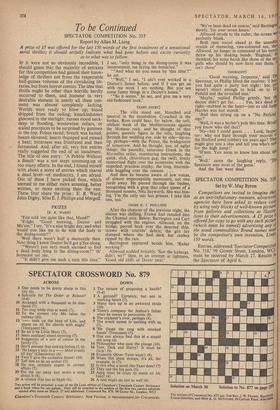To be Continued
SPECTATOR COMPETITION No. 315 Report by Allan M. Laing
A prize of £5 was offered for the last 150 words of the first instalment of a sensational serial thriller; it should artfully indicate what had gone before and excite curiosity as to what was to follow.
IF it were not so obviously incredible, I should guess that the majority of entrants for this competition had gained their know- ledge of thrillers not from the respectable half-guinea volumes of the circulating lib- raries, but from horror comics. The idea that thrills might be other than horrific hardly occurred to Them, and humour (a very desirable element in nearly all these con- tests) was almost completely lacking. Worlds were ready to blow up; blood dripped from the ceiling; knuckledusters gleamed in the starlight; heroes stood neck- deep in flooding, windowless cellars, or scaled precipices to be surprised by gunmen at the top. Pulses raced; breath was baited; beasts slavered; hearts thumped and missed a beat; bitterness was frustrated and then fermented, And, after all, very few entries really suggested the end of an instalment. The title of one entry : 'A Pebble Without a Beach' was a not inapt summing-up of too many efforts. In the end, I found myself with about a score of entries which shared a dead level—of mediocrity, I am afraid. Out of these I have picked four, which seemed to me either more amusing, better written, or more exciting than the rest. These four share the prize : E. R. Ward, John Digby, Miss E. J. Phillips and Merge.
PRIZES
(E. R. WARD)
'You told 'em quiet like that, Maud?'
'S'right. "Good morning, Doctor and Ma'am," I sez. "It's a nice bright day; and what would you like me to do with the body in the dining-room?"
`Well there wasn't half a shemozzle then. Next thing 1 knew Doctor he'd got ',lice along.
' "Weren't you very much alarmed to find a dead body lying in the dining-room?" th' Inspector ast me.
' "It didn't give me such a turn this time," I sez, "only being in the dining-room it was inconvenient, me laying the breakfast." "And what do you mean by 'this time'?" he ast.
"'Well," I sez, "I ain't ever worked in a Doctor's house before, and if I can get on with me work I sez nothing. But you see some funny things in a Doctor's house."
' "So it seems," he sez, and give me a very old-fashioned look.'
(JOHN =BY) . . . The villa stood out, blanched and spectral in the moonshine. Crouched in the bushes, Ross could hear, far below, the soft, sibilant wash of the Mediterranean against the Monaco rock, and he thought of that golden, queenly figure in the villa, laughing through her wedding eve, side by side—lip-to- lip, perhaps—with the Prince, the bridegroom of tomorrow. And he thought, too, of uglier things; the paunchy, saturnine Greek in the Marseilles cellar, murmuring instructions; the quick, slick, chloroform gag; the swift, firmly memorised flight over the mountains with the stupefied, priceless trophy; the long, intermin- able haggling over the ransom. . . .
And then he became aware of low voices, of almost imperceptible movement, not two yards away. He peered through the bushes, recognising with a gasp that other queen of a thousand screens, Nita Sayworth. She was hiss- ing, 'I'm the only star has princes. I take this one, too.'
(MISS E. I. PHILLIPS)
After the clamour of the previous night, the silence was chilling. France had receded into the Channel mist. Below, Barrington and Carr struggled with the engines. Allwood, on the bridge, peered back over the deserted ship, strewn with tourists' debris; the girl lay slumped where she had died, her clothes ripped by the rats.
Barrington appeared beside him. 'Radar working?'
Allwood nodded irritably. 'Saw the icebergs, didn't we?' then, in an attempt at lightness, 'Good old cliffs of Dover next.' 'We've been dead on course,' said Barringto1 slowly, 'for over seven hours.'
Allwood strode to the radar; the screen vial perfectly blank. Both men stared ahead at the unendill1 stretch of menacing, rust-coloured sea, the Allwood, no longer in command of his terror threw up his shaking hands. 'England,' N shrieked, his voice harsh like those of the see, gulls who should by now have met them, isn't there'
(MERGOFF)
. . . `Good morning, Inspector,' said Thi Spectator, as Phillip lifted the receiver, 'I he you had quite a party last night: but Yoll weren't smart enough to hold on to Or Pitfield and the 'so-called nun.'
'Maybe,' replied Phillip grimly, 'but tlif doctor didn't get far. . . . Yes, he's dead J right—stabbed in the heart—just as old JAC Harries was last month.'
'And then strung up on a "No Parking sign?' 'Well, it was a barber's pole this time. Would you know who did that?'
'No—but 1 could guess. . . . Look, Inspe, tor : why not hunt through your records the Harford jewel robbery ten years ago? The', might give you a clue and tell you who's neP for the high jump!'
'H'mm. You seem to know lots about 11111 case.'
'Well,' came the laughing reply, 'TIO Spectator sees most of the game.'
And the line went dead.


































 Previous page
Previous page